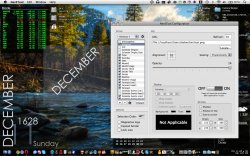here you go.
just put this code into a shell geeklet. you can change some parameters like the color of "today" marker and the separator symbol.Code:#!/usr/bin/env ruby # # Author: Robert Jorgenson # Author email: rjorgenson@gmail.com require 'Date' ABBR_DAYNAMES = {0, 'Su', 1, 'Mo', 2, 'Tu', 3, 'We', 4, 'Th', 5, 'Fr', 6, 'Sa'} def days_in_month(year, month) return (Date.new(year, 12, 31) << (12 - month)).day end def day_in_month(year, month, day) return Date.new(year, month, day).wday end def build_day_array(year, month) day_array = Array.new for d in (1..days_in_month(year, month)) day_array[d] = ABBR_DAYNAMES[day_in_month(year, month, d)] end day_array.shift return day_array * " " end def build_separator(year, month) color = "\e[30m" #black #color = "\e[37m" #uncomment for white separator_string = "██" # change this to change separator, best if 2 characters wide close = "\e[0m" # don't change this separator = Array.new for d in (1..days_in_month(year, month)) if year == Time.now.year && month == Time.now.month && d == Time.now.day then separator[d] = "#{color}#{separator_string}#{close}" else separator[d] = "#{separator_string}" end end separator.shift return separator * "█" end def build_date_array(year, month) date_array = Array.new for d in (1..days_in_month(year, month)) date_array[d] = d end date_array.shift date_array.each do |d| if d < 10 then date_array[(d-1)] = "0#{d}" end end return date_array * " " end year = Time.now.year month = Time.now.month puts build_day_array(year, month) puts build_separator(year, month) puts build_date_array(year, month)
have fun!
You are the man! Thank you so much!






